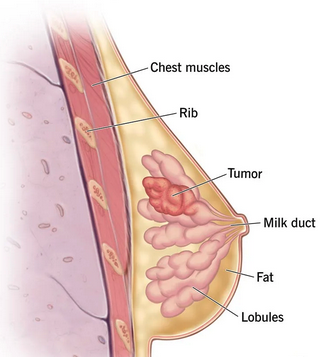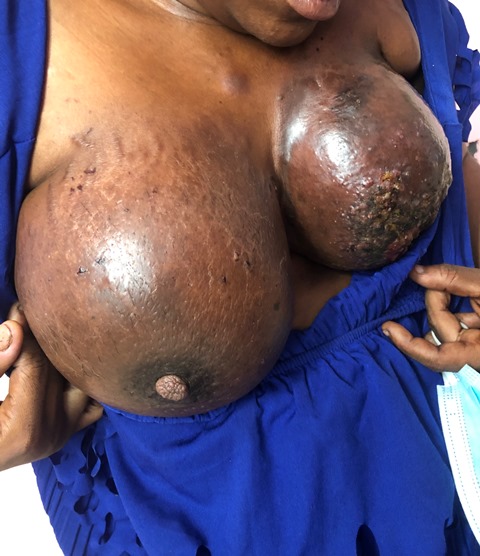Breast Cancer
What Is Breast Cancer?
Breast cancer is a type of cancer that starts in the breast. It can start in one or both breasts.
Cancer starts when cells begin to grow out of control. Breast cancer occurs almost entirely in women, but men can get breast cancer too.
It’s important to understand that most breast lumps are benign and not cancer (malignant). Non-cancer breast tumors are abnormal growths, but they do not spread outside of the breast. They are not life threatening, but some types of benign breast lumps can increase a woman’s risk of getting breast cancer. Any breast lump or change needs to be checked by a health care professional to find out if it is benign or malignant (cancer) and if it might affect your future cancer risk.
Where breast cancer starts
Breast cancers can start from different parts of the breast. The breast is an organ that sits on top of the upper ribs and chest muscles. There is a left and right breast and each one has mainly glands, ducts, and fatty tissue. In women, the breast makes and delivers milk to feed newborns and infants. The amount of fatty tissue in the breast determines the size of each breast.
The breast has different parts:
- Lobules are the glands that make breast milk. Cancers that start here are called lobular cancers.
- Ducts are small canals that come out from the lobules and carry the milk to the nipple. This is the most common place for breast cancer to start. Cancers that start here are called ductal cancers.
- The nipple is the opening in the skin of the breast where the ducts come together and turn into larger ducts so the milk can leave the breast. The nipple is surrounded by slightly darker thicker skin called the areola. A less common type of breast cancer called Paget disease of the breast can start in the nipple.
- The fat and connective tissue (stroma) surround the ducts and lobules and help keep them in place. A less common type of breast cancer called phyllodes tumor can start in the stroma.
- Blood vessels and lymph vessels are also found in each breast.
A small number of cancers start in other tissues in the breast. These cancers are called sarcomas and lymphomas and are not really thought of as breast cancers.
Types of breast cancer
There are many different types of breast cancer. The type is determined by the specific kind of cells in the breast that are affected. Most breast cancers are carcinomas. The most common breast cancers such as ductal carcinoma in situ (DCIS) and invasive carcinoma are adenocarcinomas, since the cancers start in the gland cells in the milk ducts or the lobules (milk-producing glands). Other kinds of cancers can grow in the breast, like angiosarcoma or sarcoma, but are not considered breast cancer since they start in different cells of the breast.
Breast cancers are also classified by certain types of proteins or genes each cancer might make. After a biopsy is done, breast cancer cells are tested for proteins called estrogenreceptors and progesterone receptors, and the HER2 gene or protein. The tumor cells are also closely looked at in the lab to find out what grade it is. The specific proteins found and the tumor grade can help decide the stage of the cancer and treatment options.
Risk Factors for Breast Cancer
A risk factor is anything that increases your chances of getting a disease, such as cancer. But having a risk factor, or even many, does not mean that you are sure to get the disease. While you can’t change some breast cancer risk factors, there are some risk factors that you can control. Below are some risk factors:
1. Being A Woman
2. Nulliparity
3. Elderly Primip
4. Hereditary-+Ve Family Hx
5. History Of Lumpectomy
6. Long Menstrual Period
7. Lack Of Exercise
8. Alcohol Consumption
9. Unhealthy Eating Habits
10. Smoking
Can Breast Cancer Be Prevented?
There is no sure way to prevent breast cancer. But there are things you can do that might lower your risk. This can be especially helpful for women with certain risk factors for breast cancer, such as having a strong family history or certain inherited gene changes.
- Every 19 seconds a woman somewhere is diagnosed with breast cancer (SGK)
- Every 69 seconds a woman somewhere dies from breast cancer. (SGK)


